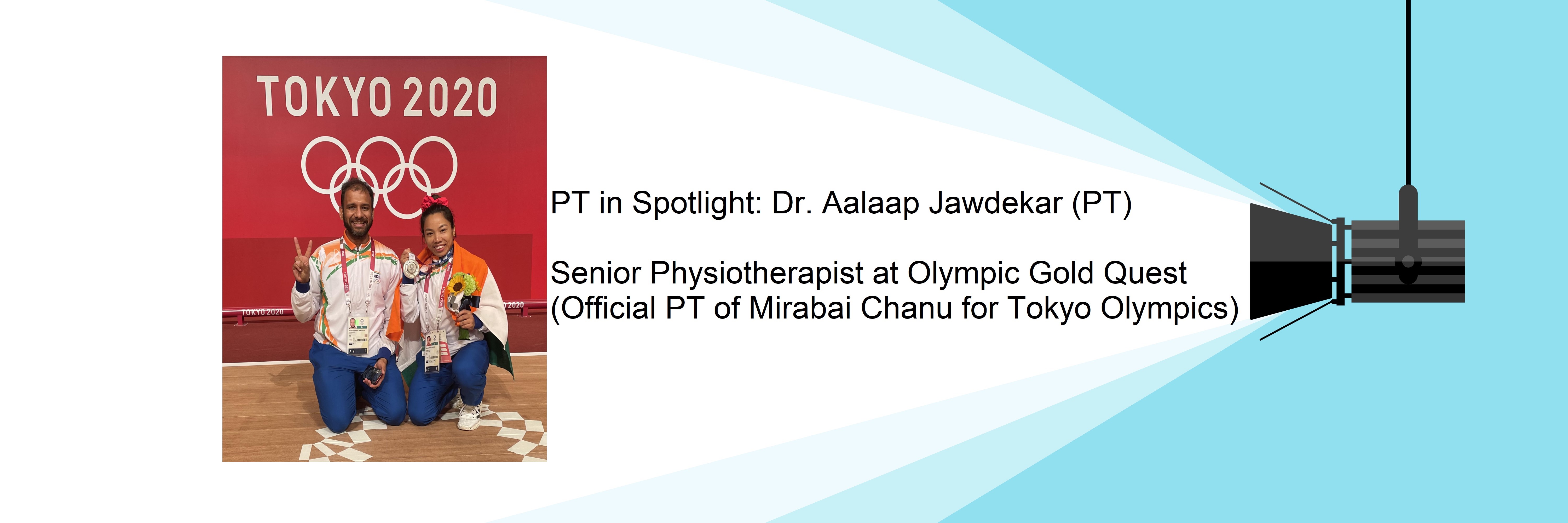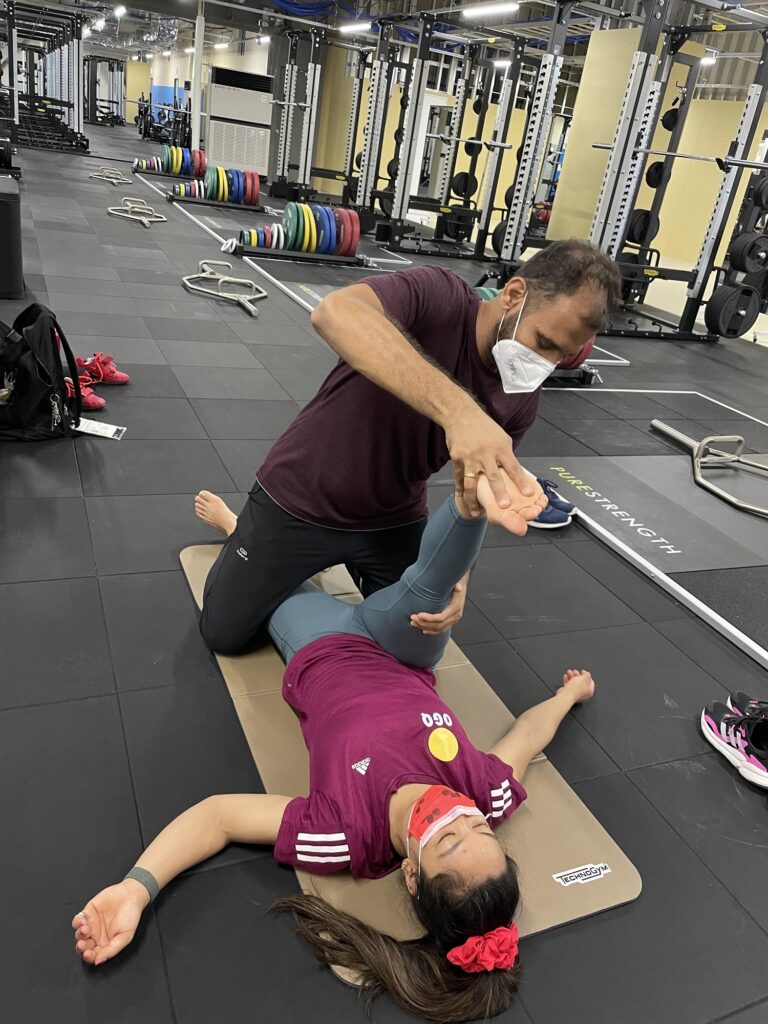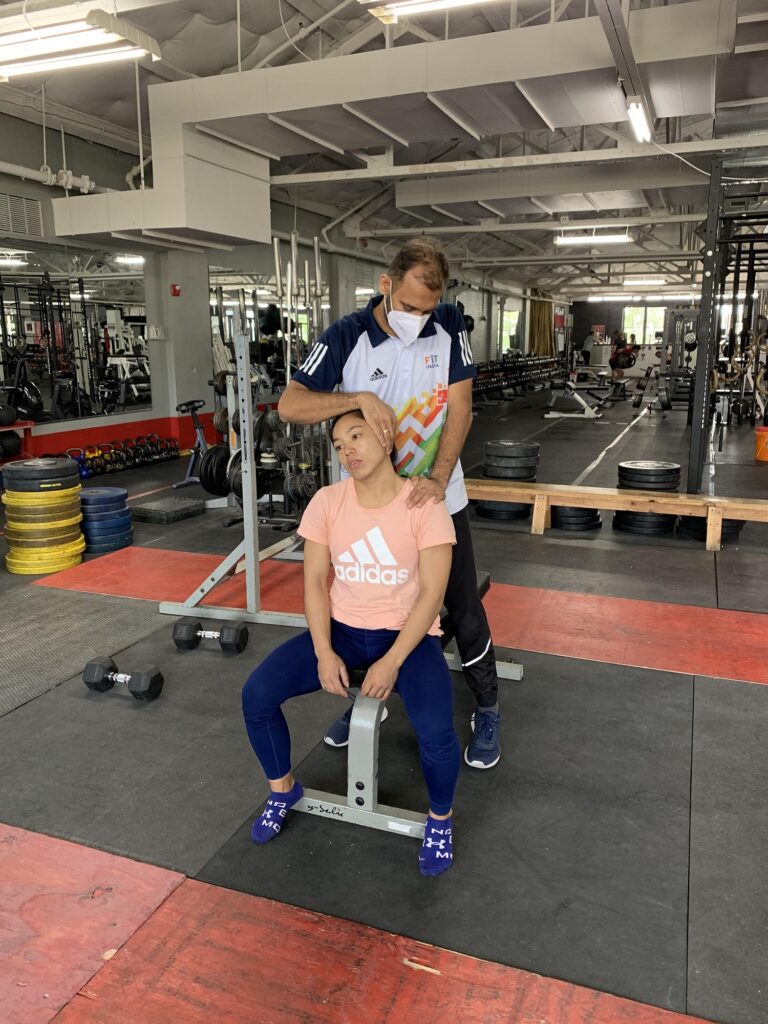
This week’s spotlight features Dr. Aalaap Jawdekar (PT) who was the official PT for Mirabai Chanu for Tokyo Olympics. Aalaap has been working with Olympic athletes for more than 6 years. He is a senior physiotherapist at Olympic Gold Quest. Over the Years he has worked with elite athletes in different sports including boxing, archery, shooting and weight lifting.
What is your name, workplace and current position?
Dr. Aalaap Jawdekar (PT)
Senior Physiotherapist at Olympic Gold Quest
What is your educational background?
Master of Musculoskeletal and Sport Physiotherapy, University of South Australia, Graduation year: 2013.
BPTh: Maeer’s Physiotherapy College, Graduation year: 2011
When and why did you decide to become a sports physiotherapist?
Since my 3rd – 4th year, it was clear to me that I wanted to do a masters in sports physiotherapy. Infact , becoming a sports physiotherapist was one of the intentions with which I decided to pursue physiotherapy in the first place.
Cricket was an important driver for me to pursue physiotherapy. When I used to watch cricket matches on television, I was always curious to know what happens when a sports physiotherapist comes on field. It is usually not shown on TV since there is a commercial break. On the other side of the commercial break, you usually see that the cricketer is fine or he goes back to the dressing room.
I always wondered what exactly happened there? All these curiosites set me up on the path of becoming a sports physiotherapist.
What did you do soon after your Bachelor’s?
Since my passion for cricket led me to become a physiotherapist, I had to do something related to it after graduating. Soon after completing my Bachelors, I volunteered as a PT for a local cricket academy in Badlapur where I used to play cricket as a kid.
In May 2012, I received an acceptance letter from University of South Australia.
Before my masters course, I completed a certification in music therapy. I love to sing. Infact, I initially gave serious thought about wanting to pursue singing as a profession.
Music therapy course gave me a different perspective. Later on, during my masters program, when we had to complete an extrapolated project, I did a project on binaural beats and neurofeedback.
I believe music therapy is an exciting field. Although what I am doing currently is far from it, sometime in the future I would like to pursue it more.
What did you do after completing your Master’s?
After my masters, starting in 2014, I worked for a year at a local Sports Medicine clinic in Australia in a small town called Mount Gambier. I was also attached to a local Australian rules football club. I completed one season with them as a PT volunteer/Sports Trainer.
In April 2015, I came back to India. I started working with Olympic Gold Quest soon after that. I have been working with them ever since.
How will you explain what Olympic Gold Quest is and what they do to a new physiotherapy graduate?
Olympic Gold Quest is a not for profit organisation. The funds generated through CSR initiatives are utilized in providing aid to the athletes supported by Olympic Gold Quest.
Olympic Gold Quest supports athletes who have the potential to win medals at the Olympics. In addition to the support provided by the Government bodies and the respective sport federations, Olympic Gold Quest supported athletes are provided with services which include, assistance in sports science, training, equipment etc. Athletes currently supported by Olympic Gold Quest include a range of junior to elite level athletes and even Para-athletes.
The sports science team includes physiotherapists, strength and conditioning coaches, sports nutritionists, and sports psychologists.
Founder members of Olympic Gold Quest are Prakash Padukone and Geet Sethi. Olympic Gold Quest officially supported it’s first athlete, Gagan Narang at the Beijing Olympics in 2008. Mary Kom, Saina Nehwal, P.V. Sindhu, Vijay Kumar are some of the athletes supported by Olympic Gold Quest over the years.
For the 2020 Olympics, Mirabai Chanu, Lovlina Borgohain, P V Sindhu and Ravi Kumar were the olympics medalists we supported.
Olympic Gold Quest functions as an independent body which works closely with the Sports Authority of India, TOPS and the federations in providing the best support to the Indian athletes.
What is a typical day of work for you?
It depends a lot on the sport/athletes I am looking after. Olympic Gold Quest supports many sports, some of them are wrestling, boxing, archery and shooting. We also support many para-athletes. If I am not a part of a national camp, I may be overseeing the training of some athletes as they prepare for their tournaments/camps at their regional centres.
If I am a part of a national camp, then it is a national duty. We literally wake up with the athletes, observe them train, treat them post training or whenever needed. We live with them on the same campus and usually also travel with them for tournaments, training camps etc.
My role involves a lot of travelling. During my time with weightlifting, I was posted at NIS, Patiala for the entire length of the camp. As part of Covid restrictions in fact we had to follow a strict Bio-bubble. In the last 6 months, I went to Uzbekistan, then came back to Patiala. A month later, I travelled to the USA. We were there for almost one and half months. From the USA, we travelled directly to Tokyo for the Olympics.
Basically we travel where the tournament is. We usually get allocated to a group of athletes and Olympic Gold Quest tries to maintain consistency for the athletes in terms of who is responsible for them. We are responsible for the overall well-being of the athletes. You have to do whatever it takes to keep the athletes fit and ready to compete at all times. The athletes are supported during season as well as during the off season phase.
As a physiotherapist at Olympic Gold Quest, who are the athletes you have worked with over the years?
So I started in April 2015, with the Indian boxing team. Olympic Gold Quest had assigned me specifically to boxers Devendro Singh, Shiva Thapa, Sumit Sangwan and Manoj Kumar who were supported by the organisation back then. However, I was posted at Patiala with the national boxing camp and my role also involved looking after the health of other boxers in the camp. There were about 60 boxers in the camp throughout that year till the Rio Olympics in 2016.
Shiva Thapa participated in the Rio Olympics. After he came back from the Olympics I continued working with him till he joined the national camp in 2017.
In 2017, I started working with the Archery Camp. I worked with archers Atanu Das, Deepika Kumari, Tarundeep Rai, Bombayla Devi Laishram and many others supported by Olympic Gold Quest at that time. I spent the whole of 2017, in the archery camp travelling to places like Kolkata and Jamshedpur. Again, my role essentially involved treating all the archers in the camp and not just the ones that were supported by Olympic Gold Quest.
In 2018, I worked with Pistol shooter Heena Sidhu. That is how I got involved with the shooting camp. At that time, I also worked with rifle shooter Gagan Narang and happened to work with many other shooters like Jitu Rai, Shahzar Rizvi, Pooja Ghatkar. I accompanied the shooters at multiple tournaments including multiple World cups, the Asian Games in 2018 and also the Shooting World Championships in 2018.
When did you start working with Mirabai Chanu?
In 2020, I was a part of the Tokyo Olympic Camp with the archery team. Camp had to break because of the pandemic. Then the camp resumed and later I got infected with Covid. So I had to step out of the camp for a while. When I recovered, I was not a part of any camp.
Olympic Gold Quest was supporting Mirabai Chanu for the 2020 Olympics but she had a physiotherapist through the camp. Her physiotherapist had to step down because of a family emergency. And they needed someone urgently.
Mirabai’s coach and the chief coach of Weightlifting, Vijay Sharma sir, had seen my work in 2015 with the boxing team. He asked Olympic Gold Quest for my availability and I said yes! The Olympic medal was there for the taking. I had to ensure that Mirabai Chanu didn’t get injured. It was easier said than done of course!


What are your work hours?
My work hours are very flexible. The hours are based on the work I am assigned.
Typically in national camps, athletes have early morning training sessions, followed by a short break. The break is for the athlete but it can be your period of work. Before the after noon session, you may get a break for about an hour. But the day ends very late. The session ends around 7-8 pm, which is followed by dinner. As a physiotherapist on most days you can be working till bedtime doing treatment sessions post dinner.
Sometimes you may need to work on Sundays too, depending on the workload. Although the athletes have a day off that day, you may still be working doing treatment sessions as needed.
What are you doing currently?
I am currently taking a short break after returning from Olympics. Although, I am still associated with Olympic Gold Quest but not an official physiotherapist of Mirabai anymore.
I am also an internal lead for Olympic Gold Quest for athlete monitoring. We use this monitoring system for performance enhancement. Recently, I have started coordinating for physio supplies for Olympic Gold Quest. I am also involved with scheduling blood tests for our athletes.
What is it that you like about your work?
Seeing these athletes at a human level during the training and later on seeing them do things with superhuman capabilities. This is the most interesting part of being with elite athletes.
To give you an example, when I worked with Shiva Thapa, a day before the game, this guy and I had a coffee together and had a nice conversation. The next day, soon after he entered the ring, he took one boxer down. At that time I had a feeling of seeing a totally different person than the one I had coffee with.
These elite athletes are all human beings. You know their human side, their emotions and sometimes the next moment you see them doing something so unearthly. Nobody understands the gravity of this experience unless you see them up close and work with them.
What is the one thing that can be improved in the field of sports physiotherapy?
I think one thing that can be improved is skill. We need more skilled physiotherapists. Experience matters the most in this field.
We do look at the evidence, yes, but it can’t determine everything. Elite athletes have very specific needs. You can not blindly use and generalise findings from the research. Hence, you need a customised, tailor made treatment approach rather than one size fits all.
You need to bridge the gap between what the evidence says and what your athletes need. For that, you require experience and skills. Unfortunately, academically we do not have exposure to elite level athletes.
You can not expect a bachelor’s graduate to land in a national camp immediately after graduation and get the job done. That currently is a fact.
What are the challenges you face?
Each sport will bring a different challenge, and sometimes it also depends on people who play that sport. You should be open to all kinds of experiences. And try to take those experiences positively.
If a new physiotherapy graduate wants to pursue sports physiotherapy, how would you advise her/him to go about it?
Gone are the days when a Bachelor’s degree would be enough, even if you had the experience as a PT with different sports. To get into elite sport, I would strongly suggest obtaining a Master’s degree in sports physiotherapy from a good university. If you know you want to become a sports physiotherapist, start getting experience immediately after graduation. You can join a local sports club or a local sports physiotherapy clinic even before you decide to enroll for a masters program.
Having other related and recognized certifications such as CSCS, is definitely a plus. If you have played a sport at any level (state, national) then it adds to your credentials and experience. It definitely gives you an edge. In my experience, physiotherapists who have played a sport have a much better understanding of an athlete’s needs.
What can a physiotherapist expect when they join Olympic Gold Quest?
There is a scope for everyone to be hired, new graduates and experienced physiotherapists.
New graduates may get posted with junior athletes first. Experienced physiotherapists will get a job based on their previous work.
How is the pay like for physiotherapists at Olympic Gold Quest?
The pay is way better than the market rates. Different people will obviously get paid differently based on their qualification and experience. All the allowances and travel expenses are reimbursed.
Do you offer observerships for physiotherapist at Olympic Gold Quest?
No. We need to maintain a certain level of confidentiality with our elite athletes. For that reason we don’t offer observerships.
What books, courses and workshops helped you in your journey?
Primarily my masters program is probably one of the best masters programs out there. It comes from the school of Maitland. Matitland used to teach there. All his disciples taught us.
Mark Jones, who is the father of clinical reasoning in the modern times, was one of our course instructors and was our program director. We also learned from David Butler. Learning ULTTs from David Butler was a one of a kind experience. All of it was beautifully taught to us.
If you are looking for courses in India, Dry needling by Prakash Shroff is exceptional.
What is your advice for physiotherapy new graduates?
Two important things: Be open to all kinds of learnings and experiences. Take them positively. It is easier said than done.
Sports is a brutal field for physios, just like it is for the athletes. Athletes need to keep proving themselves over and over again. It is true for everybody involved, coaches, physiotherapists and support staff.
Job of a sports physiotherapist may be thankless. In the end, an athlete gets the limelight, make no mistake, it is how it should be. But there is a lot of work put in by us. You should be okay not having the recognition for what you put in. If you make sure your athlete is fit and he/she is able to make it on field, then your job is done.
If you are looking for glamour, this field is not for you.
What is next for you?
I very much want to continue working with Olympic Gold Quest. Also, I am thinking of obtaining a CSCS certification (Certified strength and conditioning specialist).
In the future, I would like to venture into entrepreneurship.
Also, I have taken it as a mission to guide physiotherapists who are looking to have a career in sports. I help them figure out what courses they can take abroad, and what they should look for in a university.
Secondly, my colleague Deckline Leitao and I publish content through his youtube channel. He is a certified strength and conditioning expert. We share practical hacks for S & Cs and Physios on our channel. Check it out: https://www.youtube.com/user/decklineleitao
Where can people reach you?
They can reach me on: Instagram, LinkedIn.
You can also email me at: aalaap.physio@gmail.com
Related Spotlights:
Strength and Conditioning Academy, India, Co-Founder and Director | Dr. Apurva Mathankar (MPT, CSCS)
MSK AND SPORTS PHYSIOTHERAPIST | DR. YUVRAJ SINGH
Hello, My name is Tejashree Limaye. I am a physiotherapist with 10+ years of experience. I help you go from being stuck in your career to finding a job you love! I provide career guidance about clinical and non clinical PT career in India. I also help you with US PT licensing process. Welcome to my blog, I hope you find the exact guidance you have been looking for!
